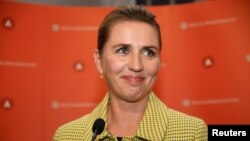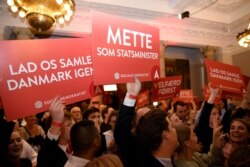The election victory last week by Denmark's Social Democrats has prompted a debate among fellow European left-wing parties: Should they, too, adopt anti-migrant rhetoric, imitate their Danish counterparts and campaign for stricter immigration rules?
Because of a surge in support in the final weeks leading up to the June 5 parliamentary poll, the country's Social Democrat-led bloc grabbed 91 of the 179 seats in the legislature, setting up the circumstances for Mette Frederiksen, 41, to become Denmark's youngest prime minister. The Social Democrats won 48 seats and are now the largest party in the Danish parliament.
The victory is being credited largely to the Social Democrats' U-turn on immigration and their embrace of much tougher anti-migrant policies more in keeping with those of their far-right rivals, including opposition to accepting refugees resettled by the United Nations; a focus on coaxing and cajoling migrants to return to their countries of origin; and harsher punishment for migrants, living in migrant-majority areas, who are found guilty of offenses.
The Social Democrats also campaigned for the closure of refugee facilities in Denmark, wanting asylum seekers to instead be held in camps established in North African countries close to conflict areas. During the campaign, Frederiksen argued it was neither "heroic nor humane to bring so many people here that the problems become huge in our own country."
Whether all these policies will survive coalition talks with the SD's partner left-wing parties remains to be seen. One of them, the Social Liberals, campaigned on an opposite platform, lamenting that Denmark had turned xenophobic.
Frederiksen's ambition to become Denmark's prime minister could still be thwarted by her left nationalism-shattering coalition talks, but she said her party is prepared to form a single-party minority government, which would allow her to ally with right-wing parties on her more restrictive immigration policy.
Common elements
There is common ground. The SD backed a range of much tougher border controls proposed by the outgoing Liberal Party government and its ally, the far-right Danish People's Party, including the confiscation of valuables from asylum seekers to defray the costs to the state for admitting them, handling their immigration applications and housing them.
The SD's electoral performance has prompted an intensification in a debate among other mainstream European left-wing parties about whether they, too, should overhaul their immigration thinking as they battle a headwind of frustration from their traditional working-class supporters.
Much of that frustration is rooted in disapproval of migration and anger at the impact of globalization and technological change, say analysts, and it explains the defections to the far-right and populist parties of large numbers of traditional left-wing supporters.
The former leader of Germany's Social Democratic Party (SPD) has pointed to the sharp change in the electoral fortunes of the Danes as a prompt for a rethink. In an opinion article in the Handelsblatt newspaper, Sigmar Gabriel praised the Danish SD's stricter asylum policy as a role model for Germany.
More than 700,000 SPD voters deserted the party for the far right in 2017 parliamentary elections. Exit polling suggested migration was the key issue in the mass defection, which propelled the far-right Alternative for Germany into the Bundestag, marking a startling new phase in the party's progress from the fringe of German politics closer to the center of power in Berlin.
Call for 'clear policy'
Gabriel said Germany's Social Democrats, who are mired in the worst crisis in their post-1945 history, should look toward Denmark. "Mette Frederiksen has shown that the Socialists can win elections if they stand for a clear policy," Gabriel wrote. "The German comrades are far from it."
In the run-up to the Danish polls, former Italian leftist leader Matteo Renzi also praised the Danish initiative. Along with former British Labor Party Prime Minister Tony Blair, he has long argued the mainstream left needs to rethink border policies.
But their opponents say that stealing the clothes of the populist right will end up undoing the mainstream left, forcing it to pay too high an ideological price. "The country's Social Democrats have disgraced themselves with anti-immigrant rhetoric," recently argued Rune Moller Stahl, a former political adviser to the Red-Green Alliance in the Danish parliament.
She points to the success in Spain of Prime Minister Pedro Sanchez's Socialists, who turned more to the radical left rather than the populist right and triumphed in recent elections.
Other critics say swerving to the right may attract some traditional right-leaning voters, but the maneuver risks losing more left-leaning voters to resurgent Green and liberal parties, which did well in the recent parliamentary elections.







